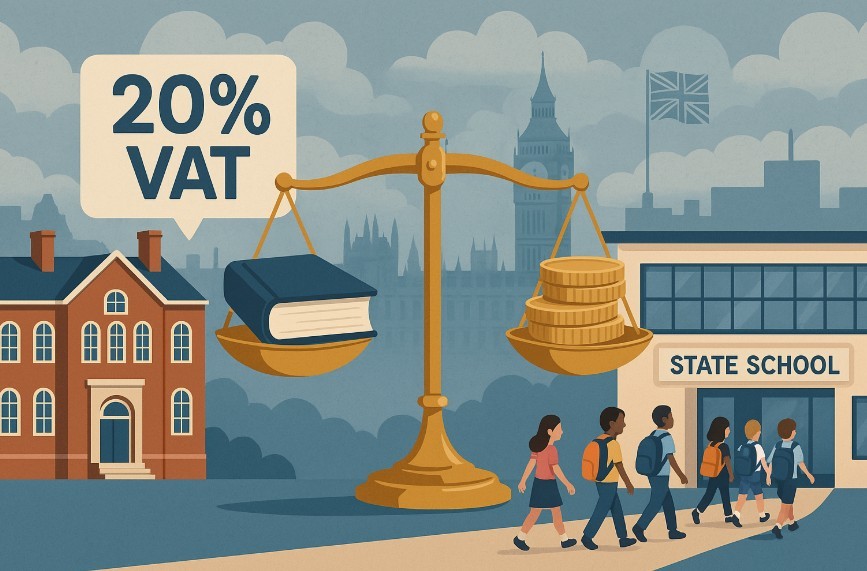Table of Contents
ToggleAre parents now paying a price for educational choice in the UK? With the introduction of 20% VAT on private school fees from 1 January 2025, families across the country are facing significant changes.
The policy, part of a broader government initiative to fund state education and reduce tax privileges for independent schools, has triggered both legal and public debate.
While the government estimates the policy will generate £1.725 billion per year to support the state sector, many parents, educators, and advocacy groups argue that it places an unfair burden on families, especially those with children who have special educational needs (SEND) or religious requirements unmet by local schools.
The move has also sparked a judicial review, questioning whether the tax infringes on the right to education under human rights law.
This blog breaks down everything parents, school leaders, and policymakers need to understand about the VAT changes, when and how they apply, who is affected, and what the potential outcomes may be for UK education policy moving forward.
What Is VAT on Private School Fees?
When Did the UK Government Introduce VAT on Private Education?
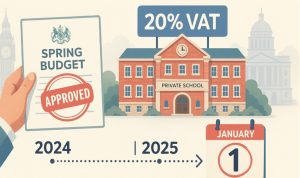
As of 1 January 2025, the UK government has implemented a 20% Value Added Tax (VAT) on private school fees across England, Wales, Scotland, and Northern Ireland. This VAT applies to both tuition and boarding charges, creating a substantial financial adjustment for families relying on independent education.
This policy change was introduced in the 2024 Spring Budget by the Chancellor and forms part of Labour’s education reform strategy. It signifies a fundamental shift in how the government views private education not as a charitable or semi-public service, but as a taxable, premium offering.
What is the Cut-off Date for VAT-free School Fee Payments?
Many families initially rushed to prepay fees in a bid to avoid the tax. However, according to HMRC, any fees paid after 29 July 2024 that cover education services rendered from 1 January 2025 onwards are subject to VAT even if prepaid. Only fees paid before 29 July 2024, under specific school pre-payment agreements, may remain VAT-free.
This condition was introduced to prevent institutions from encouraging large-scale fee prepayments, which could result in revenue shortfalls for HMRC.
Why Has the UK Government Introduced VAT on Private School Fees?
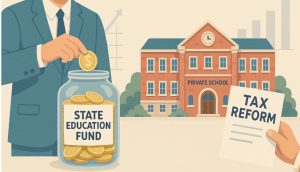
What Are the Financial Goals Behind This Policy?
The primary aim is to generate revenue for the public sector, particularly state schools, which educate around 90% of UK children.
The government anticipates this policy will raise approximately £1.725 billion annually, which will be reinvested in teacher recruitment, curriculum improvements, and school infrastructure.
In the words of the Chancellor, this is about “redirecting public benefit to where it’s most needed” a clear statement that independent schools no longer qualify for state-sponsored tax reliefs in today’s education model.
What Other Financial Advantages Are Being Removed From Private Schools?
In addition to VAT, the government is removing charitable business rate relief from April 2025. Previously, this allowed independent schools registered as charities to receive an 80% discount on their business rates.
With both VAT and rate relief gone, some schools face dual fiscal pressure that could lead to staff redundancies, programme cuts, or fee increases.
How Will VAT on Private School Fees Financially Impact Families and Schools?

Will the Cost of Private Education Rise by 20%?
While VAT is technically 20%, many schools are trying to absorb a portion of the cost through efficiency measures or budget restructuring. The average increase in tuition and boarding costs is predicted to be around 10%, though this varies significantly across the sector.
For example, a £15,000 yearly tuition fee could rise to approximately £16,500–£18,000, depending on the school’s financial strategy and location. For a quick estimate of how VAT might affect your child’s school fees, try our VAT Calculator.
How Will Middle-income Families Be Affected?
This policy disproportionately impacts middle-income families, many of whom already stretch their budgets to afford private schooling due to specific academic, social, or pastoral needs.
According to legal testimony in the High Court, about 25% of affected families fall below the national average wealth line, challenging the notion that private education is exclusively for the affluent elite.
These families are often those living in areas with underperforming state schools or those who have children with special educational needs that state schools struggle to accommodate.
Will Private Schools Reduce Bursaries or Scholarships?
Bursaries and scholarships, key tools for widening access to private education are under pressure. Many schools are reassessing their aid programmes, with some institutions reportedly scaling back awards to cover their new tax liabilities.
This could reduce the socio-economic diversity of school communities and create an even more exclusive private sector.
How Does the New VAT Policy Affect Pupils with SEND and Those in Faith Schools?
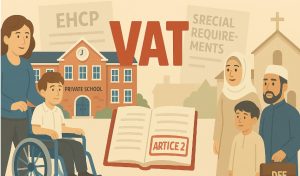
Are All SEND Students Affected by the VAT Change?
No. Pupils with an Education, Health and Care Plan (EHCP) that specifically names a private school will have their fees covered by the local authority, including VAT. In such cases, local councils can reclaim VAT, so the impact on families is minimal.
However, this applies only to a minority of SEND students, as most families privately fund specialist education for children whose needs aren’t met by mainstream schooling.
What About SEND Pupils Without an EHCP?
For pupils without a named EHCP, VAT applies in full. These families now face 20% higher school fees, despite often choosing private education as a last resort after failed placements in the state system.
The Independent Schools Council (ISC) and supporting legal teams argue this is discriminatory and fails to respect the principle of inclusive education.
How Are Religious Families Affected by the Policy?
Religious communities, especially those for whom faith schooling is integral are also affected. In areas where faith-based state schools are unavailable, families rely on independent faith schools, which are now subject to VAT. Critics argue this infringes on religious freedom, especially where alternatives are lacking.
What Is the Legal Challenge Against VAT on Private School Fees About?

Who is Leading the Judicial Review and Why?
The Independent Schools Council (ISC), in coalition with a group of SEND families and faith schools, launched a High Court judicial review in March 2025.
Represented by Lord David Pannick KC, the challenge claims that the VAT policy violates fundamental rights and unfairly targets vulnerable student populations.
The ISC represents over 1,400 private schools and argues that the government failed to consider the disproportionate effects on families with complex educational needs.
What Human Rights Are Being Cited in the Case?
The case hinges on Article 2 of the First Protocol of the European Convention on Human Rights, which states that “no person shall be denied the right to education”. The claimants argue that by making education unaffordable for some families with no state alternative, the government is breaching this article.
What is the Government’s Defence?
Barristers representing the Chancellor, HMRC, and the Department for Education argue that private education is a choice, not a right. They maintain that state-funded education is accessible to all, and that tax laws like VAT do not prevent access, but rather shift financial responsibilities.
Could VAT on Private School Fees Lead to a Shift Towards State Education?
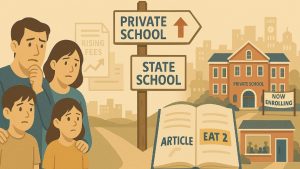
Will Parents Move Their Children Into the State Sector?
The Institute for Fiscal Studies (IFS) estimates that around 35,000 pupils, a small fraction of the total school population, may move from independent to state schools due to rising fees. However, this number is not high enough to destabilise the system.
The concern lies not in quantity, but in geography specific areas may see greater enrolment pressures than others, especially in high-performing school districts.
Do State Schools Have the Capacity to Take in More Students?
Government statistics from 2024 show:
- 83% of primary schools had one or more unfilled places
- 77% of secondary schools reported similar figures
While this suggests that national capacity exists, local conditions vary. Urban schools and specialist academies may not be able to handle sudden increases without hiring more staff, expanding buildings, or investing in additional support.
How Can Parents and Schools Prepare for the VAT Changes?
What Should Parents Know About Prepayments and VAT?
Families should seek clarification from their school’s finance office about prepayment options. While some may still offer payment plans or locked rates, the 29 July 2024 cut-off limits tax avoidance. Understanding VAT-inclusive pricing is essential for budget forecasting.
What Are Schools Doing to Manage the Transition?
Schools have taken various measures, including:
- VAT registration with HMRC
- Updating billing systems and contracts
- Conducting financial audits
- Increasing transparency with parents through newsletters and webinars
Some schools are also considering outsourcing services, cutting extracurriculars, or restructuring class sizes to optimise their finances.
Is the UK’s VAT Policy on Private Education Unique in Europe?
Do Other European Countries Tax Private Education Like the UK?
No. Legal experts representing claimants in the judicial review assert that no other Council of Europe country currently imposes VAT on mainstream private education. In most cases, education is VAT-exempt or receives substantial subsidies, even for private providers.
Why is the UK Taking This Approach?
The UK is framing education reform as a fiscal equality initiative, aiming to treat private education similarly to other commercial services. However, this ideological departure from the European consensus has drawn criticism and legal scrutiny.
How Do Private School Fees Compare Before and After VAT?
| School Type | Avg. Annual Fee (Pre-VAT) | VAT (20%) | New Estimated Fee | Notes |
| Day School | £15,000 | £3,000 | £18,000 | The actual increase may vary based on the school subsidy |
| Boarding School | £36,000 | £7,200 | £43,200 | Higher due to inclusive accommodation |
| SEND School (with EHCP) | £45,000 | £0 | £45,000 | Local authority pays and claims VAT |
| SEND School (no EHCP) | £45,000 | £9,000 | £54,000 | Full cost borne by parents |
Conclusion
The implementation of VAT on private school fees marks a critical juncture in the UK’s education landscape.
It is a policy designed to deliver greater funding to state schools and promote equality, but it also risks creating new barriers for families who rely on independent education due to academic, special needs, or faith-based reasons.
From middle-income households to SEND families and faith communities, the impact is already being felt and with the legal challenge now underway, the final word on the matter has yet to be spoken.
As schools adapt and parents reassess their options, the country must ask a larger question: Can fiscal reform coexist with educational freedom and access for all?
Whether seen as a necessary correction or a punitive measure, one thing is certain the conversation around VAT on private education is far from over. The coming months will reveal not only the judicial outcome, but the true societal cost of this significant policy shift.
FAQs About VAT on Private School Fees
Are all independent schools subject to VAT now?
Yes. Any school charging for tuition or boarding from 1 January 2025 is required to apply VAT unless exempt under local authority agreements (EHCPs).
What are parents’ options if they can’t afford the new fees?
Some schools are increasing bursary support, and parents may look into state alternatives, home schooling, or part-time private tuition.
Does this VAT apply to nursery schools or early years education?
Only if the nursery is not part of the free early education funding scheme. Otherwise, most private nursery services already charge VAT.
How is the military supporting service families affected by VAT?
The Ministry of Defence has increased the Continuity of Education Allowance (CEA) to help service families cover rising private school fees.
Will schools have to reduce extracurricular offerings?
Possibly. Some may reduce or charge separately for after-school clubs, sports, or trips, as they reassess costs under the new VAT framework.
Can parents claim VAT back on school fees?
No. VAT on private school fees is not reclaimable by individual families, even if the education is necessary due to SEND or pastoral reasons.
Could this VAT policy be reversed?
The outcome of the judicial review and future political shifts could lead to policy reversal or adjustment, but no changes are currently confirmed.

